How to Build a Healthy Gut
The research is in and we know now that much of our health is determined in the gut. The 100 trillion beneficial bacteria, or probiotics in our gut work with bodily systems to help optimize blood sugar levels, bolster the immune system, regulate mood, boost metabolism, support brain health and maintain healthy hormone levels.
This is why gut health is so closely tied to sleep, stress, hunger, energy levels and just about every other aspect of our health. Today we’re going to look at how to build a healthy gut for improved digestion and better overall health.

Digestive System Function
The digestive process actually begins before eat even put food in our mouth. When we anticipate food, the brain releases hormonal signals to the gastrointestinal tract telling it to get ready for digestion by producing digestion enzymes.
Once we place food in our mouth, its journey though the gastrointestinal tract begins. The gastrointestinal tract, also referred to as the GI or digestive tract, includes the mouth, esophagus, stomach, large and small intestines, and it’s all one long connected tube about 24 feet in length. The liver, pancreas, and gallbladder are also part of the digestive system.
Once we start eating, we begin digestion by mechanically breaking food down in the mouth. After that, food makes it way down the esophagus, into the stomach for further processing, then into the small intestine and finally into the large intestine where it eventually leaves the body as waste. This whole process can take up to 40 hours.
Let’s take a quick look at all the digestive organs and what their functions are.
Function of the Stomach
The stomach holds food while it’s been mixed with acids and enzymes to break it down. Once the contents of the stomach have been sufficiently processed, they head on to the small intestines where the absorption process begins.
To keep the stomach happy and healthy we should be conscious of portion sizes, eat plenty of fibre and manage stress which can contribute to illness us such as stomach ulcers and gastroesophageal reflux disease.
Function of the Small Intestine
The main function of the small intestine is absorption of nutrients and minerals from food. In fact, 90% of digestion and absorption of food occurs in the small ingestion, so it’s very important to keep it healthy and functioning.
Function of the Large Intestine
The large intestine, or the colon is all about processing the leftovers of the digestive process into waste.
Function of the Gallbladder
The gallbladder stores and concentrates bile, and then releases it into the intestines to help absorb and digest fats.
Function of the Liver
The multi-tasking liver has many functions in the body but in digestion its main function is to process the nutrients absorbed though the small intestine. Bile from the liver also plays an important role in metabolizing fat. If the liver isn’t functioning properly, we won’t be able to use the nutrients from the food we eat.
We can help keep the liver healthy by avoiding rancid oils, eliminating hydrogenated oils, avoiding high-glucose and fructose foods, reducing our exposure to toxins and eating liver-healing foods grapefruit, blueberries, nuts, cruciferous vegetables, avocado, lemon, turmeric, leafy greens and walnuts.
Function of the Pancreas
The pancreas produces insulin and other important enzymes and hormones that help break down foods. Supporting a healthy pancreas is much like support a healthy gut: exercise, eat low-fat whole foods, skip crash diets, don’t smoke and limit alcohol consumption.

The Second Brain
Recent studies have shown that the gut flora is so complex and helps regulate so many bodily functions that it’s now referred to as the second brain. This second brain is made up of the extremely complex system of nerves that makes up the GI tract. In fact, the gut contains more neurotransmitters than the brain!
The second brain, or enteric nervous system is constantly sending messages up to brain number one via the vagus nerve. Because of this, healthy and balanced gut flora are critical for optimal health. When we get too many bad gut bacteria in the form of parasites, yeast and bad bacteria, it presents itself as disease, weight gain and poor health.
Gut Health and Depression
We know now that most of the neurotransmitter serotonin is manufactured in the gut and not in the brain, as it was previously thought. This is why a healthy gut has such a big impact on our mental wellbeing. Studies have also indicated that the health of the gut microbiota has a significant effect on mood and our emotional health, so much that gut imbalances have been strongly connected to anxiety and depression.
Gut Health and Immunity
You might be surprised to learn that the gut is home to most of our immune system. If you think of the digestive system as a donut, you can imagine the gut as the donut hole. It’s exposed to the outside and it’s our front line of defence against any pathogens that it comes in contact with.
The protective gut lining is only one cell thick and if that barrier is damaged and particles start passing into the blood stream, the immune system can’t tell the good from the bad and autoimmune conditions and disease can occur.
Gut Health and Sleep
We also know that melatonin, which is essential to sleep, is produced in large part in the gut, not just the pineal gland in the brain which was once thought. This is one of the reasons why a healthy gut is so closely tied to quality sleep.
It all comes back to the gut. We’ve got to keep those 100 trillion bacteria happy because they really do run the ship. An unhappy gut can present itself as IBS, join pain, mood and cognitives issues, poor immunity, poor sleep quality, skin conditions or all of the above.

Leaky Gut Syndrome
Leaky gut is a condition in which the lining of the small intestine becomes damaged causing increased permeability. When this occurs, undigested food particles, waste product and bacteria can leak through the intestines and into the blood stream.
These foreign substances elicit an immune response from the body. This can cause everything from depression to inflammatory conditions. Leaky gut syndrome is all too common today and is at the root cause of many diseases. In fact, even Hippocrates is famous for saying “all disease begins in the gut.”
Leaky gut can cause a number of autoimmune responses in the body including inflammation, allergies, chronic fatigue, food sensitives, arthritis and more. Detoxification potential, inflammatory response, hormone balance, metal health…everything goes back to the gut.
It’s the biggest portal between the outside world and the inside of our body and if it’s not functioning properly, essentially our shields are down.
Causes of Leaky Gut
If you’re experiencing declined gut integrity, early signs and symptoms could include bloating, gas, irregular stool, food sensitivities and skin issues such as acne, rosacea and eczema.
Common causes of leaky gut include:
- Poor Diet. A low-fibre, high-sugar, processed, nutrient-poor but high-calorie diet causes the wrong bacteria and yeast to grow in our gut and this damages the delicate ecosystem.
- Medication. Medication, with antibiotics being the worst culprit, vastly deplete good gut bacteria. Acid blockers and anti-inflammatory medications can also block normal digestion function and damage the gut.
- Toxic overload. This can include toxin exposure though radiation or mecury, pathogens such as mold, toxins in personal care products and home cleaning products and pesticides.
- Stress. Chronic stress elevates cortisol which has negative implications for intestinal permeability. Stress could include lack of quality sleep, over training and general low level stress from everyday life.
- Infection. Chronic infections and gut imbalances such as the over-growth of bacteria in the small intestine (SIBO), yeast overgrowth and gut parasites.
- Allergies. Undetected gluten intolerance and other low-grade allergies to foods such as dairy, eggs and corn can cause irritation and inflammation in the gut.
Implications and Symptoms of Leaky Gut
Foreign substances entering the blood steam can cause autoimmune responses in the body including inflammatory and allergic reactions, migraines, irritable bowel, eczema, chronic fatigue, reduced immunity, Chrohn’s disease, lupis, food allergies, rheumatoid arthritis, acne and more.
Hormone Imbalances
The gut plays a role in metabolizing hormones so gut disorders and infections can throw off hormone levels. Leaky gut also causes inflammation which can overwork the adrenals, leading to a cascade of hormonal imbalances.
Nutritional Deficiencies
Leaky gut contributes to an inability to absorb nutrients from the food we’re eating leading to issues such as vitamin D deficiency and anemia. If you’re experiencing poor gut health, you can be malnourished even when eating a very healthy diet. We see this in obesity when people are overweight yet malnourished.
Weakened Immune System
Leaky gut can also contribute to a weakened immune system since the damaged intestinal cells aren’t producing the enzymes required for optimal digestion. As as result, the body can’t absorb essential nutrients and the immune system becomes weakened leaving us susceptible to infection.
We’ve got to heal the gut first.
As you can see, the digestive system must be fully functioning for everything else to take place.
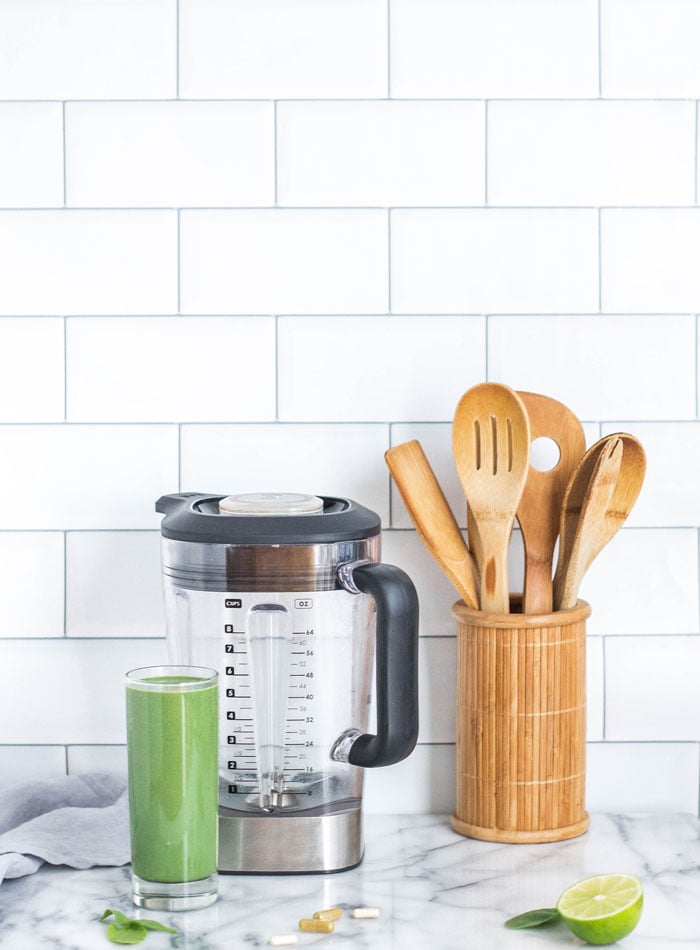
How to Asses Your Digestive Health
There’s one quick and easy way to tell if your digestive system is working properly. You guessed it, your poop of course! Poop is the best diagnostic tool we have to asses our digestive health.
A good poop should:
- happen 1-3 times daily
- come out easily without any straining
- be full and in one, long colon shape
- should be fairly substantial
- shouldn’t be too light or too dark, a nice brown poop colour is just right! LOL.
You can check out the Bristol Stool Chart for a visual on this. I’m not going to include that here. Haha.
How to Build a Healthy Gut
If you are having some issues related to the gut and digestion, the first thing you want to do is remove anything that could be exacerbating the situation. This could include gluten, sugar, dairy and other common allergens, dealing with stress, unnecessary medications. Next would be to focus on repairing the gut.
Let’s get into some tips for healing the gut. If you already have a healthy digestive system, you can use these tips to keep it that way otherwise, let the healing begin!
First we’ll get into some general tips and habits for building a healthy gut, then we’ll look at the best foods for gut health. There’s no need to get extreme when it comes to gut health. The best way to build a healthy gut and support digestion is through the way we live and eat on an everyday basis.
Chew Your Food
Chewing our food properly helps to break down larger pieces of food into smaller particles, reducing stress on the esophagus, aiding the stomach in metabolizing food and it releases saliva that contains digestive enzymes.
When we use our teeth to mechanically break down our food it puts less stress on the stomach and the rest of the GI tract. We can also reduce our risk for gas and bloating by slowing down and taking the time to chew properly. Properly chewing also makes it easier for the intestines to absorb nutrients from the food as it passes through.
Sit down for meals if you can, chew your food, put your fork down between bites to slow down, break down the food better and put less stress on your digestion system. Digestion is a demanding process that requires a great deal of energy, so we shouldn’t gulp down big chunks of food making things even more difficult for the body. When we pre-digest food, the stomach can work more efficiently and break down food more quickly.
Don’t Yo-Yo Diet
Our gut is home to about 100 trillion microbial cells that influence everything from immune function, to mood and metabolism however, when the levels and diversity of gut flora are disrupted, gastrointestinal conditions such as inflammatory bowel disease can occur.
Eat Calmly
When we’re stressed and cortisol is increased it negatively effects digestion. Try to slow down at meal times, put your phone away and turn the TV off so you can eat more mindfully.
We want to illicit the parasympathetic or “rest and digest” nervous system when we eat, rather than the sympathetic “fight or flight” system. The PNS restores the body to a state of calm and allows it to relax and repair. When the PNS is activated, saliva and digestive enzymes are increased, the heart rate slows and muscle relax, all of which helps improve digestion. I find morning routines to be helpful in eliciting the parasympathetic nervous system before I start eating in the morning. I also enjoyed the book Savor: Mindful Eating, Mindful Life.
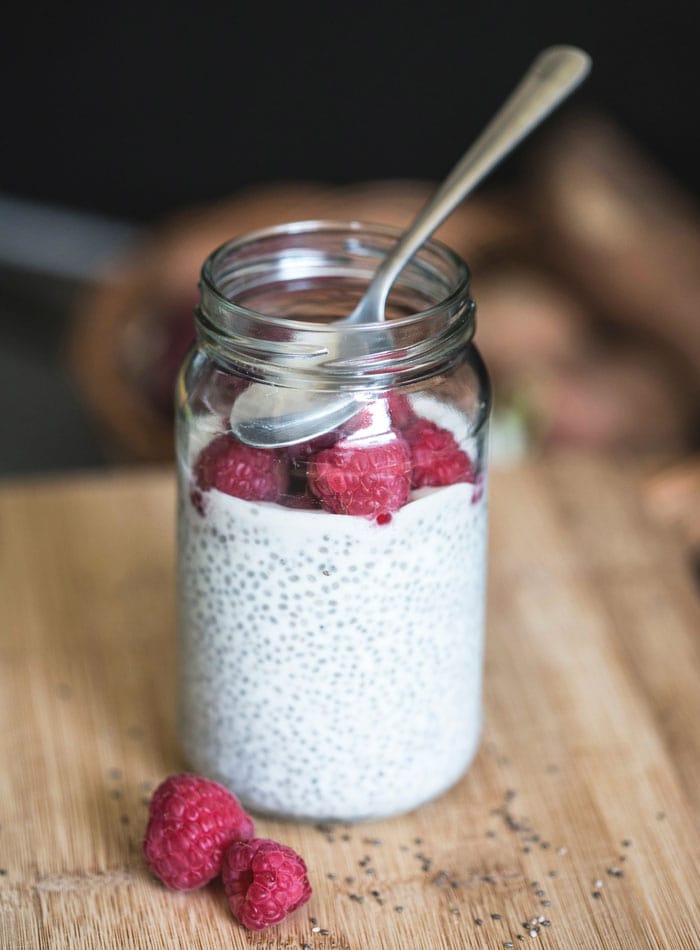
De-Stress
Stress plays a major role in gut health as the gut is vulnerable to chronic and even acute stress. The biochemical changes that occur under stress have a significant and immediate impact on digestive function, and chronic exposure to stress may lead to development of gastrointestinal diseases.
We need to take steps to bring stress levels down. Deep breathing, meditation, baths, self-care, healing baths, journalling, exercise, reading, whatever it is you need to do to slow down and turn stress off, do it. We need to have periods where we disengage, so we’re not constantly being stimulated.
Even if you don’t feel stressed in a traditional sense, it’s important to take periods of time to disengage and just be. This is where meditation can be so helpful.
Daily Exercise
Exercise also plays a role in a healthy gut so be sure to move the body daily. It literally moves things along! Exercise speeds up digestion, increases blood flow and stimulates the muscles of the GI track. Aim to exercise at least 30 minutes a day.
Hydrate
One of the main causes of slowed digestion and chronic constipation is dehydration. We need water to keep things moving though the intestines smoothly and the large intestines need water to form stool and move waste out of the body. Dehydration can also cause the body to retain fluid which can cause bloating.
I use a water reminder app in my phone because sometimes I forget to drink enough during the day. Some other tips that help me are drinking a huge glass of water first thing in the morning and bringing a water bottle with me wherever I go. You’ll know you’re drinking enough water when your pee is very light yellow to clear all day.
Ditch Gut Harming Habits
Eliminate or reduce things that deplete your microbiome, such as stress, smoking, lack of sleep, alcohol, antibiotics in food and medicine, antibacterial cleaners and processed foods. For some people, this can also include common allergens such as dairy, soy, corn and gluten. Hydrogenated oils should also be avoided, as should refined grains and sugars.
Caffeine and Digestion
Caffeine increases the production of stress hormones such as cortisol and adrenaline, causing the heart rate to increase and boosting energy and in the process, blood supply to the intestines is decreased. Caffeine isn’t an issue for everyone but pay attention to how you feel after drinking coffee. Caffeine is also acid so it increases acidity and gastric secretions, which can irritate the intestinal lining and lead to upset stomach. Excessive amounts of caffeine can lead to ulcers and gastritis.
If you’re already dealing with gastrointestinal disorders, caffeine should probably be avoided. Lower caffeine drinks such as green tea, or caffeine-free options would be a better alternative to coffee.
I love Dandy Blend, mushroom coffee, green tea, matcha, chai tea and herbal teas. Some good herbal options include ginger tea which is anti-inflammatory and healing for the gut and peppermint, liquorice, fennel, chamomile and senna leaf also support healthy digestion.
Eat A Varied Diet
Eat a wide variety of whole foods and vary how you cook them. This helps to increase the diversity of your gut microbiome and a rich and diverse gut microbiome is considered to be a healthy and strong one. A lack of diversity within the gut bacteria can limit how we recover from harmful influences, such as infection, allergens or antibiotics.
The food we eat provides the nutrients to help healthy bacteria grow and when we vary the nutrients we consume, different strains of bacteria benefit from them, resulting in a more diverse gut flora.
Every time you go to the grocery store or farmer’s market, try picking up a new vegetable, fruit or whole grain, a little diversity in the diet goes along way! This is also a great way to make sure you getting wide range of micronutrients.
The best way to build a healthy gut micro biome is to get the population of bacteria as diverse as possible and the best way to create a diverse microbiome should eat a wide variety of vegetables.
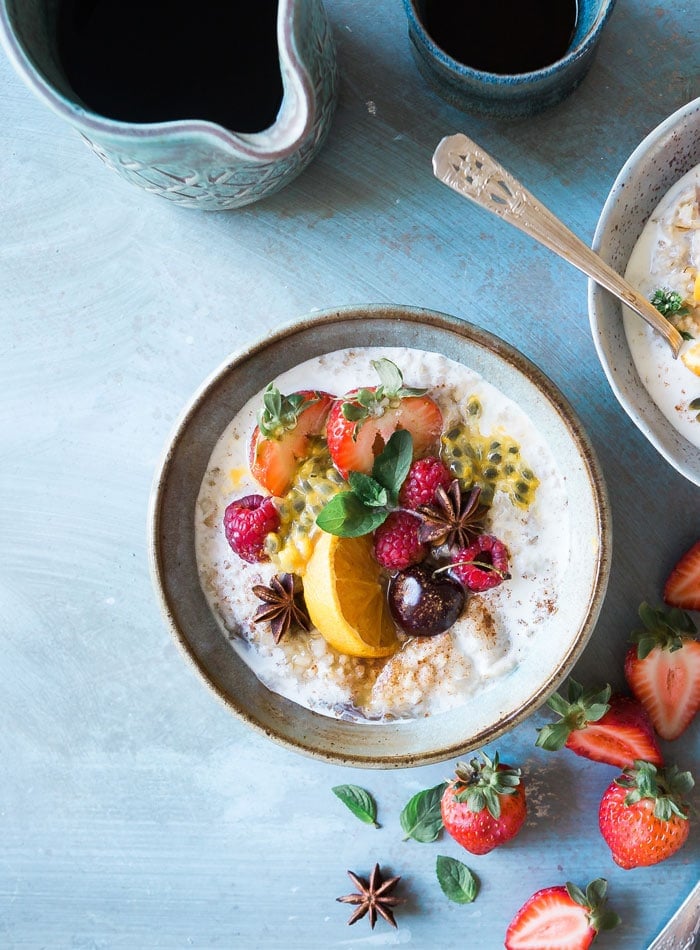
Best Healthy Gut Foods
Gut flora thrive on what you feed them. Feed them junk food and bad bacteria will grow, resulting in leaky gut, hormone imbalances and inflammation however feed them healthy, whole foods and good gut bacteria will thrive. Fortunately, the gut microbiome can quickly and significantly be impacted by what we eat, so we can begin building a healthier gut with every meal.
Eat Probotic-Rich Foods
Fermented foods and drinks such as sauerkraut, dairy-free yogurt, miso, soy sauce, pickles, kimchi, kombucha, kefir and tempeh contain beneficial enzymes and probiotics that increase the diversity and robustness of our gut microbiota. A proper balance of gut bacteria and digestive enzymes helps absorb more of the nutrients from the food you eat.
You can also supplement with a good probiotic. From what I understand, you want to look for a multi-strain, hypoallergenic probiotic, unless there’s a specific strain or species of bacteria you need. I would recommend working with a nutritionist, naturopath or other health professional if you need some help with that. Taking a good probiotic is important for sure but food always comes first, so make sure you’re getting in those delicious sauerkrauts and other fermented foods.
Eat Prebiotic-Rich Foods
This includes artichokes, barley, lentils, banana, citrus, oats, leeks, garlic, onions and apples. Prebiotics are specific types of fibre that feed the good bacteria in your gut, helping them to produce the nutrients that lead to a healthy digestion system.
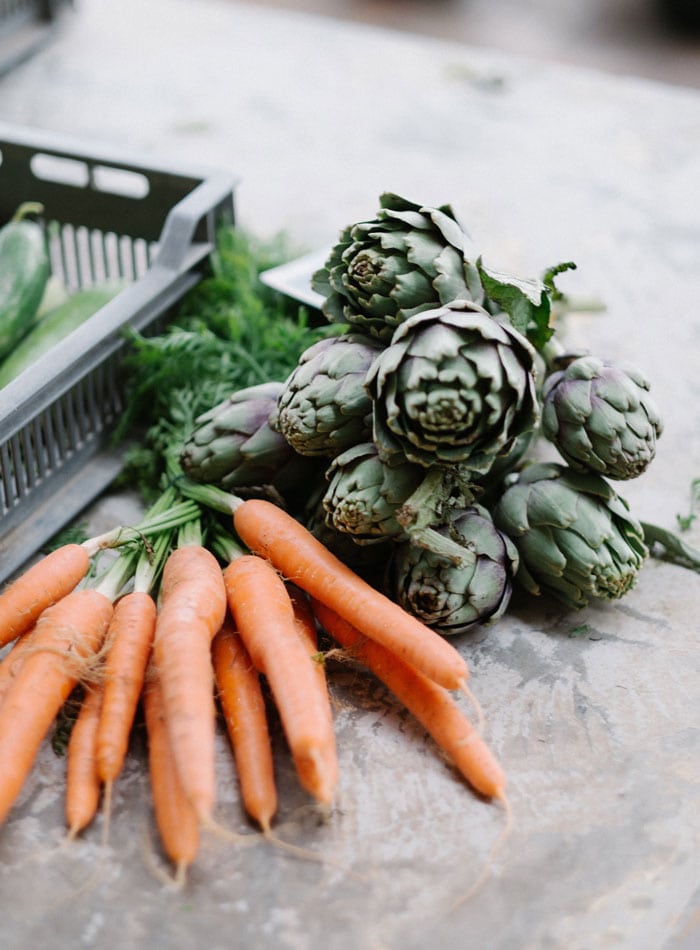
Eat Polyphenol-Rich Foods
This includes foods like apples, pomegranate, red wine, blueberries, green tea and dark chocolate. Polyphenols often make their way to the colon where they can be digested by bacteria, encouraging their growth and helping the flora to stay strong and healthy.
Eat Healthy Fats
Eat plenty of healthy fats from sources such as avocado, coconut, olives, coconut, hemp, nuts and seeds. Fat help moves things along for improved digestion, they also help the body produce bile, which is essential for optimal digestion. Some of my favourites to eat daily are ground flaxseed, hemp seed and walnuts.
Omega-3 is particularly important for its inflammatory properties. To make sure I’m getting enough omega-3 essential fatty acids, I am conscious of eating plenty of omega-3 rich foods and I also take NutraVeg Omega-3 with EPA and DHA.
Healthy fats also improve the bodies ability to absorb and metabolize fat-soluble nutrients such as vitamin A, D, E and K from other foods you eat. So, to improve absorption of the vitamins in vegetables you eat, always eat them with a bit of healthy fat. Avocado or nuts and seeds on your salad, or hemp and flax in your green smoothie works great, you don’t need much!

Eat Naturally Gut Healing Foods
Eat gut healing foods such as ginger, chamomile, aloe, slippery elm, mint, fermented vegetables and liquorice root. Nature’s got the best medicine! Soothing, gut-healing foods to support naturally support gut hormones and flora. You can also consider L-glutamine which we’ll discuss later on.
Eat Fibre-Rich Foods
Eat a diet rich in fibre and phytonutrients to keep those good gut bacteria well fed and working hard.
For optimal digestion, we should be getting plenty of both soluble and insoluble fibre in our diets, we can do this by eating a range of whole plant foods. Soluble fibre dissolves in water while insoluble fibre does not. Insoluble fibre is particularly important for digestion as it helps move things through the digestion system more easily.
My favourite high-fibre foods are whole grains, beans and plenty of fruit and vegetables. It’s recommend that you get at least 30 grams of fibre a day however most people get far less than that. I would suggest tracking your food for a week to see how much fibre you eat.
Most days I get around 50 grams of fibre. I don’t have a problem digesting that but my body is well adapted to handling it. If you’re not used to eating a high-fibre diet, make sure you increase things gradually and drink plenty of water while you do so.
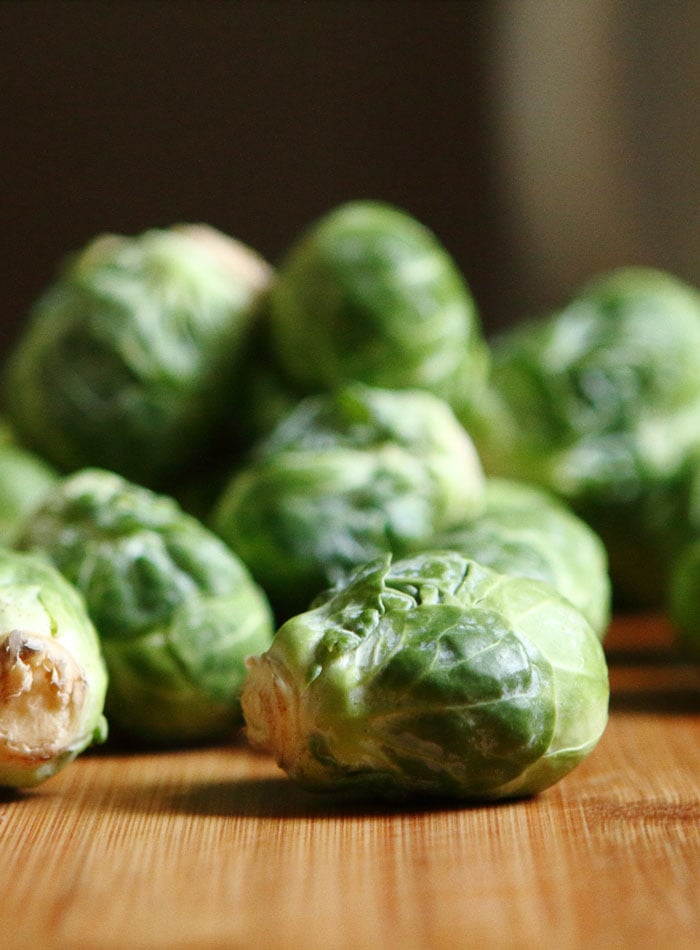
Eat Digestive Enzyme-Rich Foods
Digestive enzymes are a catalyst for digestion. They break down food molecules into more easily absorbed particles so they’re an important part of digestive health. Sprouted seeds and legumes, soaked nuts, papaya, pineapple, mango and kiwi all contain digestion enzymes.
Best Gut Health Supplements
Not everyone needs to take supplements for digestion but there are a few that are typically recommended to help heal the gut. These would be used on an individual basis and you should work with a nutritionist or MD to determine if supplementation is something that is right for you. Food should come first and supplements can help fill in the holes on an individual and as needed basis.
- Probiotic. Eat probiotic rich foods and supplement if needed.
- Omega-3. Take a supplement and/or eat omega-3 rich foods.
- Methylated B-Complex. B vitamins are important for brain and liver health and detoxification.
- Vitamin D. A consideration with auto-immune disorders because it can be difficult to keep vitamin D levels up, testing first can determine if needed.
Other Nutrient Considerations
- Iodine. Iodine isn’t something most people need to supplement but we should be conscious of getting enough in our diet. Iodine plays a role in immune and thyroid function and is an important mineral for our overall health. I include seaweed in my diet to make sure I’m getting enough.
- Zinc. Zinc deficiency can cause digestive disturbances, especially difficulty digesting protein. Each zinc-rich foods such as and consider supplementation if needed. Beans, legumes, whole grains, nuts, spinach, pumpkin seeds, mushrooms and cacao are good sources of zinc. Consider soaking and/or sprouting beans, legumes, grains, nuts and seeds to improve digestibility.
- Magnesium. Magnesium aids in the digestive process and helps regulate copper, potassium, zinc, vitamin D and calcium levels within your body. It also activates enzymes that help the body absorb and use macronutrients and it works to produce and transport energy during digestion. It’s actually an extremely important mineral for our overall health, not just for digestion. Magnesium-rich foods include whole grains, spinach, quinoa, almonds, cashews, black beans, edamame, avocado and dark chocolate.
- Fermented L-Glutamine. L-glutamine is an amino acid that helps strengthen the gut lining as it’s a source of fuel used by the cells of the gut to repair themselves. Studies have shown that supplementing with L-glutamine may decease intestinal permeability and help improve inflammatory gut conditions such as IBS, Chron’s disease, ulcerative colitis, diverticulosis, diverticulitis, leaky gut and conditions associated with leaky gut such as joint pain and rosacea. L-glutamine has also shown to have other positive health benefits such as improved energy levels, recovery from exercise and increased metabolism.
There are other supplements that can help with digestive ailments but I don’t know all that much about them. You can discuss bile support, pancreatic enzymes, MSM, NAG and other specific needs with your doctor or nutritionist.
Gut Health: Where to Go From Here
If you’ve been struggling with digestive issues or wondering if you could make improvements, try keeping a digestive journal. Self-awareness is key, so we need to actually pay attention to how we feel. For one or two weeks, write down how you feel after eating, how your bowel movements are, what your energy levels are like and if you’re experiencing any other ailments such as skin conditions or joint pain.
How do you feel if you eat a green smoothie vs. eggs for breakfast? What about oatmeal vs. a bagel. What about a carb-heavy meal versus a well-balanced meal with more fats and protein? What about dairy? Meat? Beans? This can help us pin-point foods that might be causing us issues.
We are not what we eat but what our bodies can do with what we eat. So get that gut in tip top shape to make the most of all that healthy food you’re eating!
More Digestion Resources
For more helpful articles, check out:




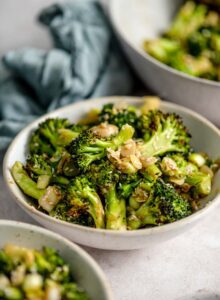

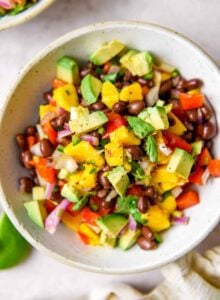
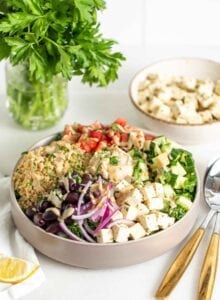
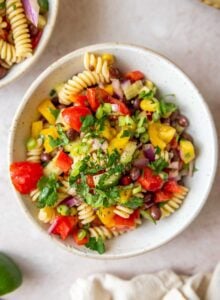
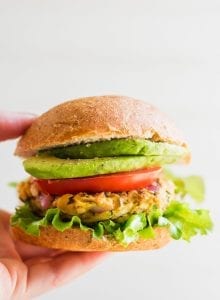
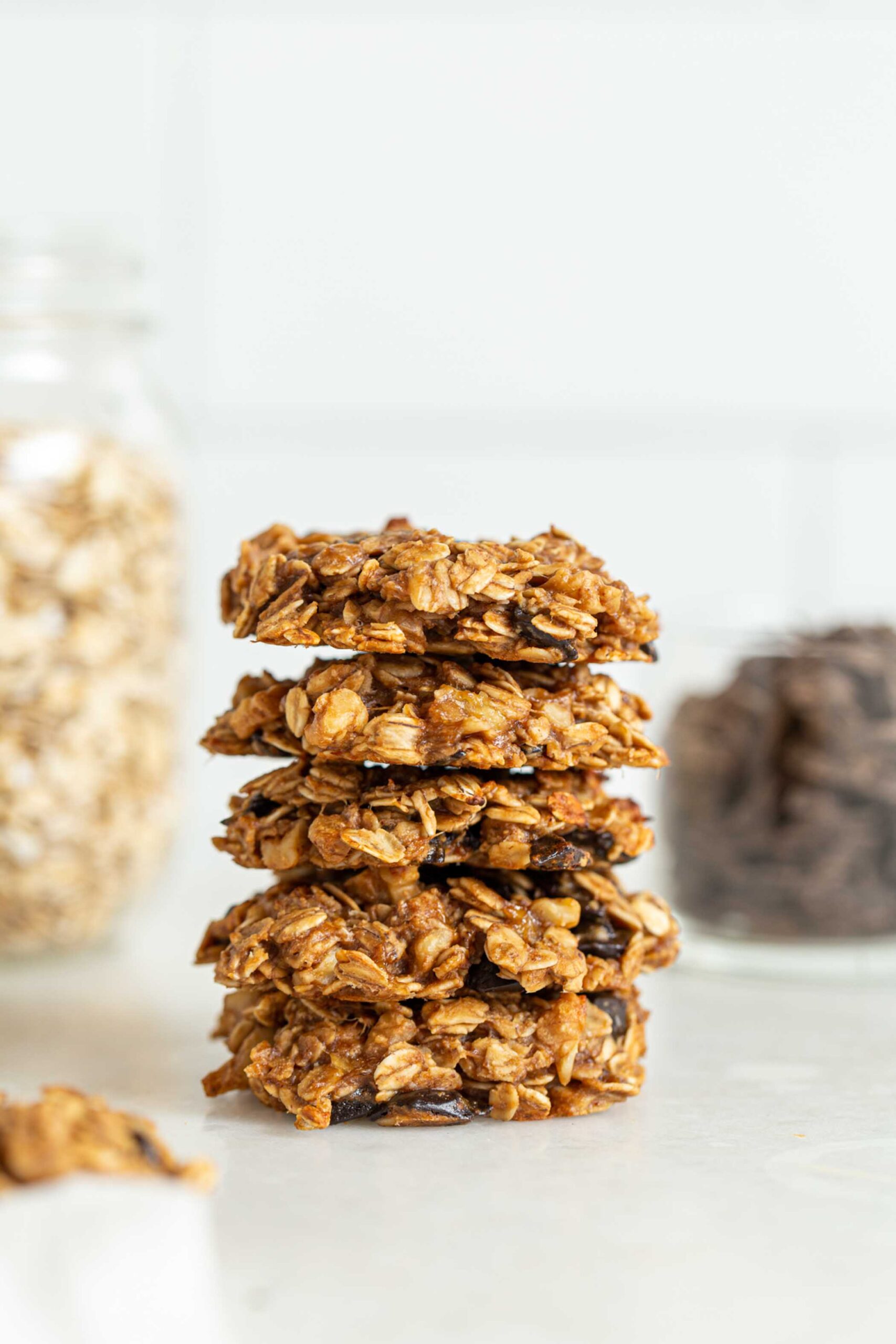




As you mentioned that an unhealthy gut can lead to joint pain, mood issues, and poor immunity, I believe that one should seek advice from a gastroenterologist on how to take care of it. Keeping the gut healthy will not only avoid those symptoms but help enjoy food as well. I will keep your tips in mind and find a medical professional immediately in order to help keep my body healthy and be able to take care of the kids as well.
Just to give you an update on my daughter. She doesn’t have celiac, thank goodness and doesn’t have irritable bowel syndrome. So the doctor is classifying her as non celiac gluten intolerant. So, has advised her to cut out all gluten from her diet and consult a dietitian. So we’ve got an appointment in a couple of weeks time. So, I’m knee deep in consulting Pinterest and websites on gluten free recipes. We’ve tried out a few so far. It’s been 2 days gluten free. Hopefully, within a week she’ll see a big improvement in her conditions, so I gather. Just glad that she doesn’t have full on celiac disease, anyhow.
That’s great to hear, all the best to her.
Thanks Deryn!! So happy she read your great article and really understood why it was so important that I got her tested. Even within 3 days she’s commented this afternoon she doesn’t have the stabby sharp knife random pains in her lower tummy area. She said, too, that some days she just felt so low, depressed, sad, anxious. So much gas too. It’s already getting better. Hurray!
Really important for my daughter to read. We’re pretty sure she has inflammatory bowel syndrome. She’s undergoing the tests for it at the moment. I’ve sent her the link to read the article via Facebook..
I hope she finds it helpful!
She had a good read of it and understands a lot better how important it is to her overall health to have a healthy gut from end to end. It explains so much why she doesn’t sleep very long, why she’s tired a lot, has a lot of issues with defecation, is always cold, esp. in the winter and just generally is in poor health and anemic.
Awesome, I’m so glad she found it helpful. I hope she can find some answers and start to feel better. All the best!
So in depth! I love how you break down the sections. Can’t wait to share it, such a fantastic resource you created!!
Thanks, Heather! So glad you found it helpful.
This post is GOLD.
Thanks Gaby!! Appreciate that.